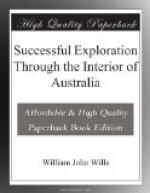Poor Wills! you will remember him as a boy. It has occurred to me that Totnes may wish in some way to perpetuate the memory of one who perished so young and with such honour in a noble cause. Should it be so, I have asked my brother to be there with something from me. Every good man must deeply regret his loss, and sincerely sympathize with his relatives and friends.
Your hero has passed to no
ignoble grave;
He died not ere a deathless
fame was won;
And earth must count amongst
her true and brave,
The brave and patient Wills,
Devonia’s son.
I am, dear Sir,
Yours truly,
Robt. Watson.
To the Editor of the Totnes Times.
. . .
To the editor of the Totnes Weekly times.
Melbourne, November 26, 1861.
By this mail, I have sent you the public journals of this city, containing detailed accounts of the Exploring Expedition, despatched hence on the 20th August last, to find its way to and return from the Gulf of Carpentaria. Only one of the party has succeeded in accomplishing this unparalleled undertaking, three having fallen victims to hunger and disease. R. O’Hara Burke was the leader of the Expedition, and W.J. Wills, a native of Totnes, and son of a physician from your locality, was the second in command, observer and astronomer. The Expedition had visited the Gulf, and had returned to Cooper’s Creek, where a depot had been formed, but unfortunately broken up only six hours before the return of the weary travellers. Their disappointment at finding such to be the case, you must gather from Wills’s journal, which was the best kept of the party, and is replete with information of the country through which they passed. To Mr. Wills, senior, the loss of his favourite son is a sad blow, under such distressing circumstances; yet, amid all, young Wills was full of spirit to the last, and his final entry in his journal must have been made just six hours before he breathed his last. For him and for them, the colonists in Australia have shed tears of sorrow, and the Government have given instructions that their remains are to be brought to the city, and interred with all the pomp and solemnity befitting such an occasion. A sum of money is voted by Parliament to mark specially the event by erecting an obelisk in some conspicuous part of the city, most probably in face of one of our Parliament Houses. A number of Devonians, however, have resolved to subscribe, and with the consent of the municipal authorities, wish to mark the event more especially in his native town; and it is thought the Plains, at Totnes, is a suitable place for the erection of such a monument. To that end, subscription lists will be opened in our principal towns, and by next mail I hope to report that satisfactory progress is being made. The school where he was educated (Ashburton), conducted, too, by a Totnes man, Mr. Paige, has not been forgotten; and as there are schoolfellows of Wills’s in this colony, they also intend bearing testimony to his worth by placing a tablet, with the consent of the trustees, in the Grammar School of St. Andrew’s. None more worthy exists in that ancient hall of learning.




